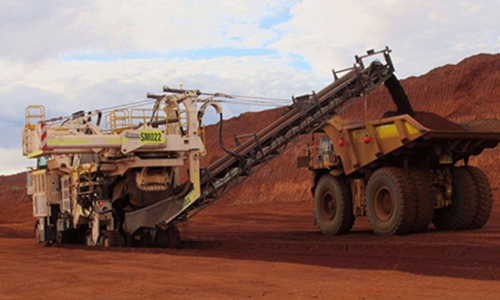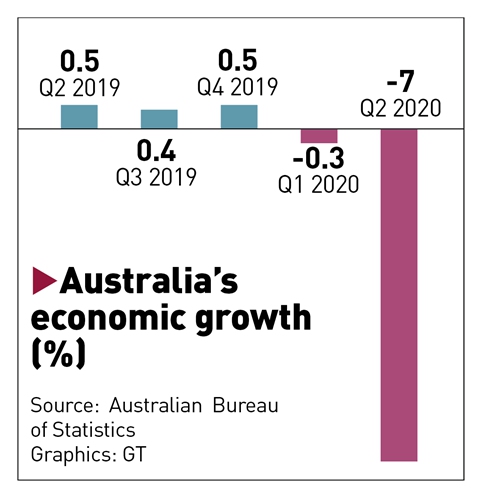Australian economy faces dim outlook
By Chu Daye Source: Global Times Published: 2020/9/2 21:43:40
Trade tension with China damages growth

An iron ore mining site in Australia Photo: cnsphotos
Australia, once a model among Western countries in fighting COVID-19 earlier this year, has recorded its first recession in 29 years amid a sudden resurgence of the pandemic. Chinese analysts said Canberra's politicization of its trade and economic ties with China, its largest trading partner, will delay the country's economic recovery.
Australia's GDP fell 7 per cent in the second quarter, the largest quarterly fall on record, the country's statistical authority said on Wednesday.
Analysts said while the pandemic crippled the Australian economy, the Morrison government had also mishandled trade and economic relations with China, whose economy is complementary to Australia. They noted that the contraction seen in the quarter would not have been so steep if there had been no trade friction with China.
Song Wei, deputy director of the Institute of International Development Cooperation at the Chinese Academy of International Trade and Economic Cooperation, said that the increasingly politicized bilateral trade and economic relationship added uncertainty to the Australian economic outlook.
"Australia's alliance with the US has had a negative impact on its foreign trade and investment, casting shadows over its economic outlook," Song told the Global Times on Wednesday.
Australia has relied heavily on the Chinese market in trade, but as a member of the Five Eyes intelligence alliance led by the US, it has supported the US' anti-China campaign, and this is driving its relationship with China to the freezing point.
The bilateral trade relationship was also upset by the Australian demand for a so-called independent investigation into the source of the COVID-19 pandemic, as well as claims of Chinese people spying on Australia.
Following the steps of the Trump administration, Australia was the first Western country to shun Chinese telecommunication giant Huawei's 5G equipment, and after that, the Morrison government blocked a series of Chinese investment deals.
In August, legislation endorsed by the Morrison government reportedly put the state of Victoria's Belt and Road Initiative agreement at great risk.
Chinese investment in Australia in US dollar terms fell 62.2 percent during 2018-19 to $2.4 billion, a report by KPMG showed in June.

Chinese analysts said the outlook for the Australian economy in the next quarter is dim as its recovery is likely to be impeded by Australia's self-inflicted damage to trade and economic ties with China.
Unable to hold its exports to the highest quality standards, Australian barley and beef exports to China are being affected, while Chinese domestic industry players are accusing Australian barley farmers and winemakers of dumping, prompting the Chinese government to slap tariffs on the products and start probing the exports.
The three items represent a total annual export value of $5.26 billion.
"The structural issues of the Australian economy remain unresolved. This situation, combined with rising anti-globalization and the ascent of a Cold War mentality and conservative power within the country, mean the outlook for the Australian economy in the September quarter is dim," Song said.
"The Australian economy will be worse off in the September quarter if it cannot get the pandemic under control and it also follows the US to escalate economic tensions with China," said Tian Guangqiang, assistant research fellow with the National Institute of International Strategy at the Chinese Academy of Social Sciences.
"An economy heavily reliant on trade that can't get its relationship with its biggest trading partner on track... a negative outlook is guaranteed," Tian told the Global Times.
Besides being the largest export market for Australia, China is also a vital market for Australian services, notably tourism and overseas students.
China is now Australia's largest source of international visitors with 1.39 million visits made to the country in 2018 and tourist spending of A$10.4 billion ($7.64 billion).
The country's vital iron ore exports to China recorded a 12 percent fall in July from the level in June, after certain Australian politicians even said that Australia could inflict "serious damage" on China by boycotting the iron ore trade.
Newspaper headline: Australia faces dim outlook
Posted in: ECONOMY,BIZ FOCUS